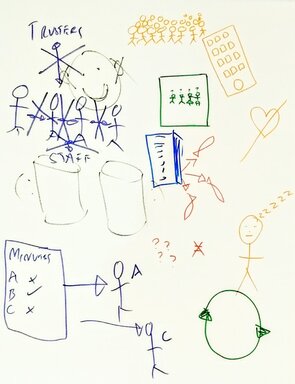|
‘We don’t have a plane crash scheduled for today, but I thought I’d take you through the emergency procedures just in case.’ (KLM Air Hostess) I love the difference that a sense of humour can make. The air hostess (above) made everyone laugh during the passenger safety briefing on a return flight from the Netherlands today. The airline’s own plane had experienced maintenance problems so it had had to borrow one from another airline. One hostess complained, with a glint in her eye, that the green décor didn't match the blue colour of her uniform. The passengers all laughed when another hostess made an announcement too, aiming to draw our attention to an apparent information light on the plane…only to correct herself moments later with, ‘Oh – this plane doesn’t have one!’ Brilliant. It took the terror out of the turbulence. On a more serious note, I had been in the Netherlands to work with a diverse NGO leadership team, to support its desire to enhance its international teamwork. I referenced briefly a couple of places in the Bible where the writer comments on the amazing potential of human diversity – where the Divine whole is seen, known and experienced to be more than the sum of its parts – yet also hints at the corresponding dark risks of undervaluing, fragmentation and conflict if not. Strikingly, the writer moves on in both places to emphasise a deep need for authentic love as the critical success factor. This insight set a spiritual-existential tone for the day, as we reflected on team-as-relationships. Returning to the plane – but this time as a metaphor, a participant from South Africa asked, ‘How many separate parts is a Boeing 747 aircraft made up of?’ Apparently, the answer is about 6,000,000. ‘And what do these diverse components all have in common?’ Puzzled faces all round now. ‘None of them can fly.’ I thought this was genius. What a great way to dispel the myth of the all-sufficient self in the face of the dynamic complexities of teams, organisations and wider world. We worked through an Appreciative Inquiry next, drawing on positives of the past and aspirations of the present to co-create shared trust and vision for the future. Set the trajectory. Fasten seatbelts. Enjoy the flight.
16 Comments
Cliché: ‘There’s no I in Team’. Linguistically correct; yet conceptually so wrong! Inspiring and effective teamwork is always a dynamic interplay between I, you, we and they. It’s the magic that occurs where personal leadership and team leadership intersect and collide; releasing fresh insight, energy and potential. Here (below) is a short case example. What do you think? I remember their faces vividly. I was invited to work as team coach with a leadership team that was experiencing significant conflict. Our introductory meeting was filled with deafening silences, with team members looking around or down at their notes to avoid painful eye contact. The next step was to meet with each team member individually. A resounding, recurring theme emerged: the conflict was between 2 team members, with each of the 2 attributing the blame to the other, and the rest of the team were innocent bystanders. It was the 2 protagonists who needed to change. I invited each of the bystanders, separately, to look back to the last time conflict erupted in a team meeting. ‘What happened?’ They each described the behaviour of the 2. ‘And what did you do?’ They each described sitting back, saying nothing. ‘And why was that?’ Their responses ranged from, ‘I didn’t want to get caught up in the conflict’ to, ‘I didn’t want to be seen as taking sides’ to, ‘I didn’t want to make things worse.’ I pressed on with the challenge, ‘So, as a leader, what could-will you do differently next time?’ They looked bemused, or alarmed, and shuffled uncomfortably in their seats. What we are seeing here is an intersection between personal leadership and team leadership. The conflict between the 2 was influenced, or supported, or sustained, by the behaviour, the passivity, of the wider group. I teased out different scenarios with the bystanders, the kinds of interventions they could make instead: e.g. ‘I feel really uncomfortable when this kind of conflict breaks out in a meeting.’; ‘When you 2 fight, I find myself withdrawing.’; ‘Let’s find another way to tackle this that doesn’t get so heated.’; ‘Let’s look at how to hold robust conversations that feel more constructive.’ At the next team meeting, I invited team members to share their reflections from our conversations, along with what they would take responsibility for and what they were willing to do. I was amazed by the courage and humility that surfaced: ‘I sometimes sit quietly and don’t say anything when I should. I’m going to try to speak up in future. I want you to help me to do it.’; ‘I play it safe when I should take more risks. From now on, I’m going to say what I’m thinking and feeling, even if I feel scared.’ It was the start of a transformational leadership-team process…where everyone changed. How can I help you build a more inspiring and effective team? Get in touch! [email protected] An opportunity to receive questions. ‘Swap your difficulties, not your cleverness.’ (Reg Revans) You may have heard of Action Learning – a powerful tool used in organisations and between peers to learn in the context of action, and act in the context of learning. It typically involves one person presenting an issue, and then receiving critical questions from peers that enable them to think it through for themselves and reach their own solutions. In this sense, we could think of a conventional Action Learning process as a group-team of individuals providing coaching-consultancy to an individual. I saw this idea turned on its head on a trip to Africa. An organisation was grappling with key strategic issues and invited leaders and professionals to form Action Learning sets to address them. Instead of one person presenting, however, the groups first spent time clarifying and crystallising their own issues. They then asked of themselves and each other: What are the critical questions that, if we could answer them, would provide us with strategic options? They finished by reaching agreement on solutions. It’s the first time I had seen Action Learning used as a collective venture in this way. It was a a shared, relational process of inquiry, ownership and problem-solving wherein the group itself functioned simultaneously as both client and coach-consultant. I have seen similar patterns of approach used in Asia since. What strikes me is that this isn’t just a different, novel methodology or technique. It’s the product of a deep cultural mindset, belief and stance that sees, values and places the group first. In my experience, there are corresponding benefits and risks to working in these different ways. An individual-orientation can develop personal insight, awareness and autonomy yet may lack ‘the whole is greater than the sum of the parts’ strength and cohesion in addressing change. A group-orientation, on the other hand, can bring the latter advantages to bear, yet faces its own risks including social loafing, conflict-avoidance or group-think. I’m curious, therefore: what have been your experiences of Action Learning? I worked with a leadership team recently where we experimented with reframing statements from problems-focus to solutions-focus to see what would happen if we did. The team had been grappling with difficult issues for some time which had led some to the near-resigned conclusion that there was little hope of change. I wondered whether part of the challenge and resulting mood lay in the psychological-linguistic framing of the issues rather than, necessarily, in the issues themselves.
I was curious and invited the team to be curious too about how the issues were being perceived, construed and articulated within the team – a kind of team self-talk, if you like. If someone said, ‘X will not work because of Y’, we experimented with reframing the statement as a question instead, e.g. ‘Given Y, what would it take for X to work?’ It shifted the conversation from a definitive, closed end to an open, curious, exploration of new possibilities and ideas. It created fresh energy too. I’ve worked with some clients where a person may comment that, for instance, ‘X is a good idea in principle but it would never work here.’ It’s often a response from someone who has worked a long time in the same place, has been around the proverbial block a few times or is starting to feel a bit jaded. I try to tune into the mood, acknowledge the underlying feeling and then reframe it: ‘OK, so what would work here?’ or, perhaps, ‘If X is a good idea, what would it take for it to work here?’ In my experience, solutions-focus works best when done in an open (e.g. prayerful) spirit, eliciting values (what matters to you – to motivate), creative visioning (what do you/we hope for – to inspire), appreciative inquiry (what’s working well – to build on) and affirming strengths (what are you/we good at – to draw on). Positive appraisal of the present with optimistic aspiration for the future lead well into: ‘So, what would need to happen for that to happen?’ and, ‘The next step?' The team decided to work on clarifying its purpose, it’s raison d'être, it’s answer to the, ‘What are we here to do?’ question. It had been thinking about its ways of working, its team meetings, its mode of operation. It made sense to step back, at least one step, before stepping forward. As team coach, I stepped in briefly to suggest that they start by clarifying the questions they were seeking to answer. They settled on, ‘What is our optimal role?’ and ‘How can we add value?’
I asked again, ‘So how might you do this?’ A team member responded quickly, ‘Let’s discuss it and see what we come up with.’ The others nodded in agreement. As they turned to talk, I interrupted by pushing a metaphorical pause button, ‘And how else could you do this?’ They looked puzzled then one said, ‘We could each write down a purpose statement on a post-it note then compare and contrast what we’ve written?’ I repeated, ‘And how else could you do it?’ They looked confused and then thought hard. ‘We could split into 2 x 3s, work on one question each then compare?’, ‘We could brainstorm ideas on a flipchart?’, ‘We could share our visions of a team from hell, what to avoid at all costs?’, ‘We could draw pictures instead of writing words?’ They combined the final 3. Each person grabbed a coloured pen, stepped up and a provocative, vivid, collage emerged. Their chosen technique generated laughter, insight and great ideas! The principle here is how to challenge habitual, default patterns of behaviour, how to pause and reflect critically and creatively before diving into action. Posing the simple question, ‘How else could we do this?’ can significantly enhance team energy, engagement – and effectiveness. It’s tempting to think the world has gone crazy. A crisis in one place followed in quick succession by a crisis somewhere else. Yet situations and events that appear completely unrelated can look mysteriously connected once we pause, step back from the dramatic media rhetoric and look more deeply. ‘What is really going on here?’, ‘What is influencing what?’, 'What patterns and links are forming?'
McDermott & O’Connor in ‘The Art of Systems Thinking’ distinguish between: simple complexity (e.g. a car engine that is complicated because it has numerous parts - yet it parts interact predictably and in fixed ways) and dynamic complexity (e.g. human systems such as families, teams, communities, nations etc. where different parties not only interact but change and influence each other). Dynamic complexity at a global level is being accelerated and amplified by technology and social media that enable people to connect, interact and influence each other faster than ever before. As Wheatley explains in ‘Leadership & The New Science’, however, this does not necessarily create ever-increasing chaos. It’s as if even complex human systems find their own equilibrium and flow. So what does this mean for leadership, OD and coaching? Firstly, look beyond the issue itself to inquire into ‘what else’ is creating and sustaining the conditions for it to arise. Secondly, view human systems in terms of relational influence rather than mechanics. Thirdly, be curious and responsive to what and where energy is emerging and shifting. Fourthly, be ready to let go - and dance! 'The notion of choice lies at the epicentre of human experience.’ (Popova on Frankl)
The idea of choice, the ability to choose freely, lies at the heart of personal leadership. It can be profoundly liberating and empowering and, at the same time, carries with it genuine responsibility and accountability. It means that a person is an agent of his or her own experience, not merely a passive recipient. If I can choose, it means I have options. I can change things. I’m not fixed. Take, for instance, ‘I have to go to this meeting’ or, ‘I have to complete this report by Friday.’ This language reflects and influences a person’s psychological framing of a situation and emotional response to it. ‘I have to...’ suggests the person’s decisions and actions are being driven entirely by forces external to them. It’s as if there is only one course of action available – and no choice. Morgan says, ‘People have a knack for getting trapped in webs of their own creation.’ So try instead with active voice, ‘I’m going to choose to go to this meeting’ or, ‘I will choose to complete this report by Friday.’ It can feel like a shift in ownership, an injection of energy. Choices have consequences - yet the action, the feeling, of choosing can move a person or team from passivity to proactivity. In my experience, to raise awareness and stimulate personal leadership and choice, leaders, coaches, OD professionals and trainers can hold up mirrors and pose questions such as: ‘What words are you speaking to yourself?’, ‘What assumptions are you making?’, ‘Who or what is constraining you?’, ‘What are you willing to take responsibility for?’, ‘What are you willing to choose?’ I did a coaching demonstration in front of a group of experienced mentors this weekend. In feedback afterwards, one person asked how I managed to (a) engage enough with the person to ensure they felt heard and understood and yet (b) remain disengaged enough to avoid being drawn too far into their situation with them. Another participant posed a similar question: how do I empathise and convey empathy to a person whilst holding a retaining a healthy and useful degree of detachment?
These are great and important questions for leaders, coaches and facilitators. Earlier in my career, I was working as an internal OD consultant and one of my client groups said they thought it would be helpful if I could know more about their work and become more embedded with them. I felt a bit concerned at hearing this (‘Are they saying I don’t understand them and, therefore, I’m not able to add enough value?') so spoke with my supervisor. He responded wisely: ‘Don’t play into that game.’ He was right. I order to add optimal value in that situation, I needed to understand and feel just enough of the client’s situation and experience to give them confidence that I was with them and, at the same time, to remain sufficiently detached to be able to bring fresh insight, perspective and challenge. The risk of being ‘embedded’ is that we become too immersed in the same institutional influences, agendas, cultural dynamics and personal circumstances that the client already is and feels stuck in. So how to engage yet disengage? How to hold that creative tension without snapping in one direction or the other? Here are some ideas: 1. Be clear about your role in that situation – what it is you are there to be and do. 2. Pay attention to what you see, hear and feel when you are with the client, team or organisation – key headlines, themes, metaphors, intuitions and emotions. 3. Offer your insights as process observations - ‘What I’m noticing is…X…what I’m aware of is…Y’ How about you? This was an HR team. A group of experienced professionals working hard but struggling, somehow. They felt together but separate. They invited me to meet with them, to help them create and sustain a greater sense of teamwork. We rented a room off-site and I marked a large outline of a person on the ground using white tape. It looked like one of those outlines police use to mark the position of a body(!).
The team arrived and, being from a Christian organisation, I opened by referring to the image of a body in the Bible, a metaphor that aims to convey the importance of diversity, contribution, care and interdependence. I then invited the team to stand on the ‘body’ on the ground in a place that best represented for them how they saw themselves and how they felt within the team and in the wider organisation. One person stood on the head. Others stood on the arms, hands, legs and feet. After a moment, I asked them to look around and to say what they noticed, how it felt to stand where they were standing, what they noticed about others and what they noticed about the team as a whole. Everyone commented on how they found themselves standing instinctively on ‘doing’ parts of the body - hands, feet etc. After a few minutes, the team leader, a deeply intuitive woman, looked up and spoke: ‘We’re all looking outwards. There’s no-one at the heart.’ It was as if something of profound significance had emerged in the room, in that physical space. ‘We are so busy supporting others outside of the team that we haven’t paid attention to what we need.’ ‘Let’s explore what a team with a heart would look and feel like - then let’s be and do it.’ I could feel a real shift in energy and insight. It was as if something had been released and a heavy burden had been lifted. Fresh awareness, hope and ideas poured into the room. Physical experimentation and movement had enabled something to take place that may not have happened, or at least with the same degree of experiential impact, through group conversation alone. Note to self: if in doubt, just do it. Do your conversations ever feel dull, pedestrian? Do you find yourselves reaching agreement quickly but sense there’s a lack of inspiration, depth or stretch to what you’ve decided? There’s an idea in Gestalt coaching that involves experimenting with polarities. When exploring an issue or when people can’t think of useful options, try introducing opposite extremes.
I met with a leadership team this morning to look at talent management. Rather than opening with a proposal, a colleague and I sat at opposite ends of the table and role played a conversation in which each of us argued passionately for radically contrasting approaches. We invited the team to listen, to feel, to see what it evoked for as we played out the different scenarios. Claire Pedrick uses a technique that involves opening the arms out wide to signify a polarity. ‘Let’s imagine this extreme (looking to one hand) involves doing nothing. Let’s imagine this extreme (looking at the other hand) is the ‘nuclear option’. What would the nuclear option involve doing in practice? Now let’s explore other options that lie in the space between.’ I sometimes use a polarities technique in leadership workshops. For example, if exploring directive vs non-directive approaches, I may walk an imaginary line across the room and explain at each end what that extreme represents. I then invite the group to stand along the line. ‘Where do you find yourself most of the time?’, ‘Where you would like to be?’ When using physicality like this, it can be very powerful to ‘do it’ rather than ‘imagine it’. So, if the group is standing along a line as above, I will invite them to move physically to where they want to be, rather than just talk about it. Then, ‘How are you feeling as you stand there?’, ‘What do you notice about where others are standing?’, ‘Have a conversation – where you are now.’ Another polarity technique is great for exploring the merits and risks of a proposal. Using a flipchart, I will start by inviting the group to brainstorm all the positive benefits. I will then use another flipchart and invite the group to brainstorm all the reasons why it won’t work. I use a final chart to brainstorm, ‘So, in light of that…what would it take to make it work?’ The benefits of polarising in ways such as these can include: stretching the imagination, discovering new/radical ideas, surfacing diverse views and feelings, experimenting with courage, testing different experiences and approaches, releasing fresh insight and energy. If you have worked with polarities, I’d love to hear from you. What did you do? What happened? |
Nick WrightI'm a psychological coach, trainer and OD consultant. Curious to discover how can I help you? Get in touch! Like what you read? Simply enter your email address below to receive regular blog updates!
|







 RSS Feed
RSS Feed